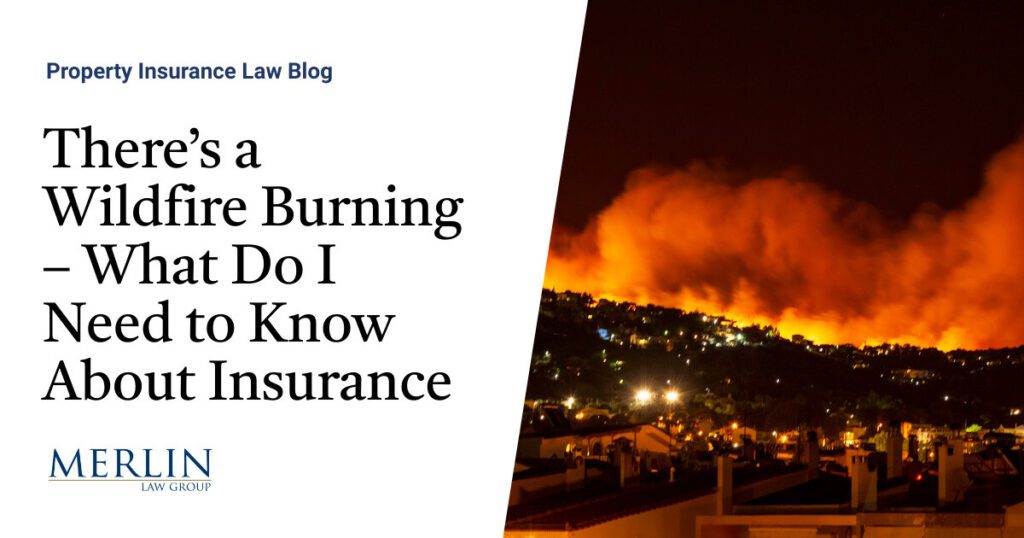There’s a Wildfire Burning – What Do I Need to Know About Insurance?

Wildfire season is here, and if you’ve experienced a loss, navigating your insurance claim can be daunting. Here’s what Californians need to know on day one to get your claim off on the right footing.
Check Your Coverage Limits and Address Underinsurance Issues.
Ideally, you already know your coverage details, but if not, review your policy immediately. Insurers are required to explain and disclose all benefits, 1 but proactively understanding your policy can help. Check your declarations page for coverage limits. If your coverage is insufficient, known as underinsurance, bring this to the attention of experienced insurance counsel for review and advice.
In a state-declared State of Emergency, the duration limit for loss of use benefits is extended, as well as the time to rebuild. Insurance Code §§ 2051.5(b), 2060(b). Homeowners can also combine their dwelling and other structures limits to rebuild a home. Insurance Code § 10103.7(a).
Submit Your Claim Promptly.
Timely submission of your insurance claim can be crucial. Delaying could, in some cases, allow the insurer to deny payment. Notify your insurance company of the loss as soon as reasonably possible. If you don’t have your policy on hand, request a full copy from your insurer. Insurers must acknowledge your claim within 15 days, respond within 15 days of each communication, provide all claim-related documents 15 days after a request, provide a full policy 30 days after the request, and issue undisputed payments within 30 days, though this period can be extended if justified. 2
Keep a Claims Diary.
Keep a claims diary and document each conversation with the insurance company or other relevant folks. This will be helpful if a claim dispute arises. Claim disputes are very common.
Seek All Immediately Available Payments.
For total losses in a State of Emergency, homeowners are entitled to an advanced payment for living expenses for at least four months of expected costs. 3 Even if there is no direct property damage but an evacuation order is in place, homeowners can claim living expenses. The insurer must provide a minimum of two weeks of coverage for evacuation orders. 4 Insurance companies must also provide a list of covered expenses for loss of use, and business owners can often claim temporary rental locations and lost income. 5 Further, in a State of Emergency, your insurer must offer you no less than 30% of your insurance limit for personal contents, without requiring an inventory of lost contents. 6
Track Expenses Meticulously.
Immediately after a wildfire, you’ll incur costs for housing, contents, and other expenses. Save all receipts and document your expenditures, noting any unrelated large expenses mixed in on receipts to avoid delays in reimbursement.
Secure Your Property As Soon As Possible.
If your property is still standing, take steps to secure it against vandalism and theft. Failure to do so can result in the denial of benefits for subsequent losses.
Document Your Loss.
Even for a total loss, the insurer will need some proof to issue payments. Partial losses and smoke damage claims should be extensively documented with photographs and videos, and consider retaining a hygienist quickly for smoke damage claims.
Documenting Personal Contents.
Getting reimbursed for lost personal contents requires detailing each item, its age, and condition. Document your losses promptly to avoid memory challenges. Insurers must offer at least 30% of your contents coverage limit without evidence in a State of Emergency, and any further payments can be based on inventories with broad categories of lost contents, but you need documentation to claim further benefits. 1
Don’t Rush Rebuilding Decisions.
Rebuilding or repairing after a wildfire is a long process. Take your time to make informed decisions. You may choose to rebuild elsewhere or purchase an existing property. Fully vet contractors before hiring them, and get realistic bids for repairs or rebuilding.
Consider Hiring A Public Adjuster.
Public adjusters can represent you in dealing with your insurance claim, especially in estimating repair or replacement costs. They get very busy after major wildfires, so make an informed decision quickly if you choose to hire one. The legal time period to cancel a public adjuster contract is extended in a State of Emergency from three to five days. Insurance Code § 15027.
Keep Paying Your Premium?
You don’t need to continue paying premiums for a destroyed building to receive benefits, but you may need different coverage moving forward. An insurance agent can help you navigate these decisions.
Follow Official Announcements.
Stay updated with announcements from the Department of Insurance and local authorities. Attend informational events by organizations like United Policyholders.
Conclusion
These are just some of the immediate steps to take following a wildfire. The insurance claim process is complex, time-consuming, and often difficult, with the insurance company’s expertise and potential for stonewalling. For personalized assistance and to ensure your claim is handled correctly, consider seeking legal counsel.
For more detailed information or assistance, contact our law firm to help navigate your wildfire insurance claim and secure the benefits you’re entitled to.
1 10 Cal. Code Regs. § 2695.7(a).
2 10 Cal. Code Regs. §§ 2695.5(b), (e), 2695.7(h), (c)(1).
3 Insurance Code § 2061(a)(1).
4 Insurance Code § 2060(c).
5 Insurance Code § 2060(a).
6 Insurance Code § 10103.7.
7 Insurance Code §§ 2061(a)(2)-(3).



